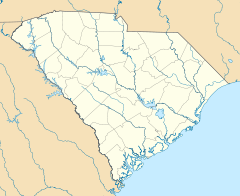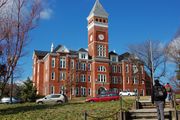Fort Hill (Clemson, South Carolina)
|
Fort Hill (John C. Calhoun House)
|
|
| File:Fort Hill, Clemson SC.jpeg | |
| Location | Clemson University campus, Clemson, South Carolina |
|---|---|
| Coordinates | Lua error in package.lua at line 80: module 'strict' not found. |
| Built | 1802[1] |
| Architectural style | Greek revival |
| Part of | Clemson University Historic District II (#89002139) |
| NRHP Reference # | 66000708 |
| Significant dates | |
| Added to NRHP | October 15, 1966[2] |
| Designated NHL | December 19, 1960[3] |
| Designated CP | January 4, 1990 |
Fort Hill, also known as the John C. Calhoun Mansion and Library, is a National Historic Landmark on the Clemson University campus in Clemson, South Carolina. The house is significant as the home from 1825-50 of John C. Calhoun, a leading national politician of the period, and is now a museum and library maintained in his memory.
Contents
History
The house was originally built as a four-room house about 1803 and was called Clergy Hall by Dr. James McElhenny, who was the pastor of Hopewell Presbyterian Church. The home later became the home of John C. Calhoun and his wife Floride Calhoun in 1825. Calhoun enlarged it to fourteen rooms and renamed it Fort Hill for nearby Fort Rutledge, which was built around 1776. The architectural style is Greek revival with Federal detailing and with simple interior detailing.[4]
After Calhoun's death in 1850, the property passed to his wife to be shared with three of her children: Cornelia, John, and Anna Maria, wife of Thomas Green Clemson. Anna sold her share to Floride Calhoun. Floride Calhoun sold the plantation to her son, Andrew Pickens Calhoun, and held the mortgage. After Andrew died in 1865, she filed for foreclosure against Andrew's heirs prior to her death in 1866. After lengthy legal proceedings, the plantation was auctioned at Walhalla in 1872. The executor of her estate won the auction, which was divided among her surviving heirs. Her daughter, Anna Clemson, received the residence with about 814 acres (329 ha) and her great-granddaughter, Floride Isabella Lee, received about 288 acres (117 ha). Thomas Green and Anna Clemson moved into Fort Hill in 1872. After Anna's death in 1875, Thomas Green Clemson inherited Fort Hill. In his 1888 will, Clemson bequeathed more than 814 acres (329 ha) of the Fort Hill estate to the State of South Carolina for an agricultural college with a stipulation that the dwelling house "shall never be torn down or altered; but shall be kept in repair with all articles of furniture and vesture... and shall always be open for inspection of visitors."[5] Clemson University has operated Fort Hill as a house museum as stipulated in the will. The house is all that remains of what was once an extensive plantation estate.[6]
The home was designated a National Historic Landmark in 1960.[3][1]
Fort Hill was closed for a two-year restoration project and was reopened in spring of 2003. Fort Hill was named a national treasure by the Save America's Treasures program, and its artifacts are currently undergoing a comprehensive conservation program funded by this federal grant and matching funds.
See also
- List of National Historic Landmarks in South Carolina
- National Register of Historic Places listings in Pickens County, South Carolina
References
| Wikimedia Commons has media related to Fort Hill. |
- ↑ 1.0 1.1 Lua error in package.lua at line 80: module 'strict' not found. and Accompanying eight photos, from 1974 and undated PDF (32 KB)
- ↑ Lua error in package.lua at line 80: module 'strict' not found.
- ↑ 3.0 3.1 Lua error in package.lua at line 80: module 'strict' not found.
- ↑ Edgar, Walter. South Carolina Encyclopedia (2006). p. 334, ISBN 1-57003-598-9
- ↑ E. M. Lander, Jr., The Calhoun Family and Thomas Green Clemson: The Decline of a Southern Patriarchy (1983) University of South Carolina Press, Columbia, SC.
- ↑ Lua error in package.lua at line 80: module 'strict' not found.
External links
- Clemson University and Fort Hill, at Clemson University
- Fort Hill, Pickens County (Clemson University), including 12 photos, at South Carolina Department of Archives and History
- Historic American Buildings Survey (HABS) No. SC-344, "Fort Hill, Clemson University Campus, Clemson, Pickens County, SC", 122 photos, 19 color transparencies, 28 measured drawings, 41 data pages, 13 photo caption pages
- HABS No. SC-344-A, "Fort Hill, Office, Clemson University Campus, Clemson, Pickens County, SC", 1 photo, 4 measured drawings, 4 data pages, 1 photo caption page
- Fort Hill Historical Marker
- Historic district contributing properties in South Carolina
- Pages with broken file links
- Commons category link is locally defined
- Houses completed in 1803
- Clemson University campus
- National Historic Landmarks in South Carolina
- Historic American Buildings Survey in South Carolina
- Houses on the National Register of Historic Places in South Carolina
- National Register of Historic Places in Pickens County, South Carolina
- Calhoun family
- Museums in Pickens County, South Carolina
- Historic house museums in South Carolina
- University museums in South Carolina
- Libraries in South Carolina
- Houses in Pickens County, South Carolina
- Clemson, South Carolina




